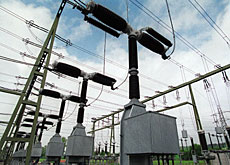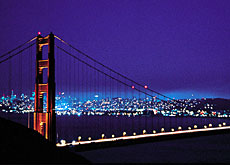Swiss pull plug on electricity deregulation

Swiss voters have ditched a government proposal to liberalise the electricity market and bring Switzerland into line with the rest of Europe.
The result is a victory for opponents who played on consumers’ fears that deregulation would lead to price hikes and cause confusion.
Opponents, led by the trade unions and leftwing groups, argued strongly against tampering with a system that worked and was understood by everyone.
“I think the security of the existing system helped our campaign very much,” Rolf Zimmermann, general secretary of the Swiss Federation of Trade Unions, told swissinfo.
“People voted for a stable public service.”
Swiss energy minister, Moritz Leuenberger said he was disappointed with the outcome and blamed the defeat on a general fear of liberalisation.
In the run-up to Sunday’s vote, Zimmermann tapped voters’ fears by highlighting the negative aspects of deregulation in neighbouring Germany and Austria.
He said consumers had been left confused and irritated by the bureaucracy of having to choose their supplier – despite the prospect of lower bills.
In Germany, only 3.7 per cent of households have bothered to switch to a new electricity provider.
Opponents also raised the spectre of California, where consumers faced power cuts following liberalisation of the electricity market.
Prior to the vote, many observers had stated that the outcome would hinge on whether people thought prices would go up in the event of deregulation.
However, Zimmermann insisted this had been just one of a number of factors that had contributed to the government’s defeat.
“Crucially, the promoters of the initiative couldn’t guarantee that the prices would go down with liberalisation,” he said.
More than 52 per cent of voters turned down the proposal. Turnout was 44 per cent.
No choice
At the moment Switzerland’s electricity is run largely at cantonal level, and consumers are forced to buy their power from the local supplier.
Under the new law consumers would have been able to shop around for an electricity supplier, comparing prices and forms of power.
The supply lines, however, would have been administered by a single national network company, guaranteeing power producers access to all parts of the grid.
Supporters of the legislation, including the government, business and industry, claimed deregulation would radically increase consumer choice and promote competition among providers.
They said electricity users would, for example, be able to stipulate that the bills they paid were invested in green, or renewable energy.
However, Katharina Stampfli, director of Swiss Electric, the umbrella organisation which brings together Switzerland’s six biggest power producers, said government arguments in favour of liberalisation had not been clear enough.
“The law was very complicated and the part of the population which didn’t vote for it had difficulty in understanding it,” she said.
“It wasn’t a law for the free market but it was to give new conditions to the market – and that’s fairly difficult to understand.”
Stampli added that the decision left Switzerland at odds with the rest of Europe, which could lead to difficulties in the future.
“We’re afraid that the ‘no’ will create a lot of problems with our neighbours, in terms of the import and export and transportation of electricity… it would be much easier to have the same rules all over Europe.”
Deregulation inevitable?
Prior to the vote, industry watchers had said that a “no” vote could hinder Swiss power firms operating abroad.
They added that a failure to get to grips with foreign competition could leave Switzerland’s 900 or so utilities lagging behind their European counterparts.
Despite Sunday’s rejection of deregulation, supporters remain convinced that some form of liberalisation of Switzerland’s electricity market is inevitable.
“We are in the process of opening the electricity market throughout Europe, including Switzerland,” said Stephan Vaterlaus, an analyst at Plaut Strategy business consultants in Bern.
“The only question is whether we have a controlled process or a free for all.”
Swiss Electric also believes that the liberalisation question needs to be moved on and should not allowed to stagnate.
“It’ll take at least three or four years before the issue comes to a vote again and the next proposal might not be as good,” said Katharina Stampfli.
“The competition commission might also want to step in and take some measures to move the issue forward.”
swissinfo with agencies
Switzerland’s electricity industry accounts for 20,000 jobs
There are 1,200 electricity utilities in Switzerland.
55 per cent of Swiss electricity comes from hydroelectric power, 40 from nuclear power.
Switzerland’s small businesses buy SFr3.5 billion worth of electricity every year.

In compliance with the JTI standards
More: SWI swissinfo.ch certified by the Journalism Trust Initiative

You can find an overview of ongoing debates with our journalists here. Please join us!
If you want to start a conversation about a topic raised in this article or want to report factual errors, email us at english@swissinfo.ch.